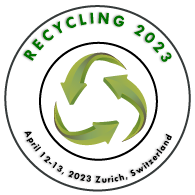Recycling of Food and Agricultural Waste
Waste is an inevitable byproduct of most human activity. The amount and complexity of waste generated in Asia has increased due to economic development and rising living standards, and the region's industrial diversification and expansion of its health-care system have added significant amounts of industrial and agricultural hazardous waste as well as biomedical waste to the waste stream, potentially posing serious risks to both human and environmental health.
Aquaculture, farming, and other agricultural pursuits all result in residue. One of the more environmentally responsible methods of handling organic waste is composting, which also enhances soil fertility and structure. Increased agricultural waste recycling is necessary to advance the economy, protect the environment, preserve natural resources, and encourage
Related Conference of Recycling of Food and Agricultural Waste
Recycling of Food and Agricultural Waste Conference Speakers
Recommended Sessions
- Bioremediation
- Challenges in Plastic Waste Collection and Segregation
- Cylindrical Plastic for Packaging
- E-Waste
- Electric Vehicle (Ev) Batteries Circular Economy
- Innovation & Technology in Plastics Recycling
- Management and Recycling of Waste
- Physical & Chemical advanced Recycling
- Plastics Recycling Opportunities and Challenges
- Recovery of Thermal Waste
- Recycling Chemical Waste
- Recycling Industrial
- Recycling of Food and Agricultural Waste
- Recycling of Metal
- Recycling of Paper
- Solid Waste Management
- Start-up Showcase,
- The Bio-Electrochemical Treatment System is on
- The Bioplastics
- Treatment of Waste Water

